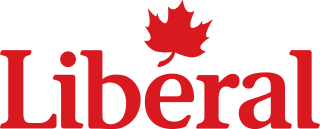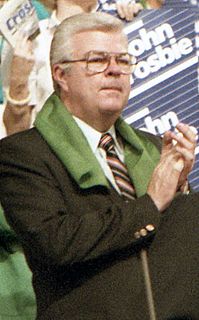Related Research Articles

The Canadian Alliance,formally the Canadian Reform Conservative Alliance,was a centre-right to right-wing federal political party in Canada that existed under that name from 2000 to 2003. The Canadian Alliance was the new name of the Reform Party of Canada and inherited many of its populist policies,as well as its position as the Official Opposition in the House of Commons of Canada. The party supported policies that were both fiscally and socially conservative,seeking reduced government spending on social programs and reductions in taxation.

John Napier Wyndham Turner was a Canadian lawyer and politician who served as the 17th prime minister of Canada from June 30 to September 17,1984. He served as leader of the Liberal Party of Canada and leader of the Official Opposition from 1984 to 1990.

Martin Brian Mulroney is a Canadian lawyer,businessman,and politician who served as the 18th prime minister of Canada from 1984 to 1993.

Charles Joseph Clark is a Canadian statesman,businessman,writer,and politician who served as the 16th prime minister of Canada from June 4,1979,to March 3,1980.

The Progressive Conservative Party of Canada was a centre-right federal political party in Canada that existed from 1942 to 2003.

The Liberal Party of Canada is the longest-serving and oldest active federal political party in Canada. The party has dominated federal politics of Canada for much of its history,holding power for almost 70 years of the 20th century. As a result,it has sometimes been referred to as Canada's "natural governing party".

The Reform Party of Canada was a right-wing populist and conservative federal political party in Canada that existed under that name from 1987 to 2000. Reform was founded as a Western Canada-based protest movement that eventually became a populist conservative party,with strong Christian right influence and social conservative elements. It was initially motivated by the perceived need for democratic reforms and by profound Western Canadian discontent with the Progressive Conservative Party.

The 1993 Canadian federal election was held on October 25,1993,to elect members to the House of Commons of Canada of the 35th Parliament of Canada. Considered to be a major political realignment,it was one of the most eventful elections in Canada's history and dramatically remodeled the Canadian political structure. Two new regionalist parties emerged and the election marked the worst defeat for a governing party at the federal level. In a landslide,the Liberal Party,led by Jean Chrétien,won a majority government.
The Conservative Party of Canada,colloquially known as the Tories,is a federal political party in Canada. It was formed in 2003 by the merger of the two main right-leaning parties,the Progressive Conservative Party and the Canadian Alliance,the latter being the successor of the Western Canadian-based Reform Party. The party sits at the centre-right to the right of the Canadian political spectrum,with their federal rival,the Liberal Party of Canada,positioned to their left. The Conservatives are defined as a "big tent" party,practising "brokerage politics" and welcoming a broad variety of members,including "Red Tories" and "Blue Tories".

The 1984 Canadian federal election was held on September 4,1984,to elect members to the House of Commons of the 33rd Parliament of Canada.

John Carnell Crosbie,was a Canadian provincial and federal politician who served as the 12th lieutenant governor of Newfoundland and Labrador,Canada. Prior to being lieutenant governor,he served as a provincial cabinet minister under Premiers Joey Smallwood and Frank Moores as well as a federal cabinet minister during the Progressive Conservative (PC) governments of Joe Clark and Brian Mulroney. Crosbie held several federal cabinet posts,including minister of finance,minister of justice,minister of transport,minister of international trade,and minister of fisheries and oceans.
William Heward Grafftey,was a Canadian politician and businessman.

Michael M. Fortier,is a Canadian financier,lawyer and former politician. A member of the Conservative Party,he served as Minister of Public Works and Government Services from 2006 to 2008,and Minister of International Trade in 2008 under Prime Minister Stephen Harper. Fortier served in Cabinet of Canada while a Senator,which proved controversial. In 2008,he resigned from the Senate to run for a seat in the House of Commons in the 2008 election;he placed second in riding of Vaudreuil-Soulanges.

Pierre Claude Nolin was a Canadian politician and Senator. A prominent member of Conservative Party of Canada from 2004 till his death,he became an influential strongman in the Party's parliamentary caucus.

The 1983 Progressive Conservative leadership election was held on June 11,1983 in Ottawa,Ontario to elect a leader of the Progressive Conservative Party of Canada. At the convention,Montreal businessman and lawyer Brian Mulroney was elected leader on the fourth ballot,defeating former prime minister and party leader Joe Clark.

The 1976 Progressive Conservative leadership election was held at the Ottawa Civic Centre in Ottawa on February 22,1976,to elect a leader of the Progressive Conservative Party of Canada to replace Robert Stanfield,who had resigned after losing the 1968,1972,and 1974 elections. It unexpectedly elected a 36-year-old,little-known PC Member of Parliament from Alberta as the party's new leader. Joe Clark defeated Claude Wagner on the fourth ballot of the convention by a margin of 65 votes.
The 1998 Alberta Senate nominee election,formally the 2nd Alberta Senate nominee election of Alberta was held on October 19,1998 to nominate appointments to the Senate of Canada. The Senate nominee election was held in conjunction with Alberta municipal elections under the Local Authorities Election Act.
Jean Bazin,Q.C.,Ad.E. is a Canadian lawyer and former senator.
Fernard Roberge is a hotelier and former Canadian Senator.

The 1998 Progressive Conservative leadership election was held on October 24 and November 14,1998 to choose a successor to Jean Charest. This was the first time the Progressive Conservatives used a one member,one vote system to choose a leader rather than a delegated leadership convention,which has been the norm since 1927. The 1998 election used a point system that allocated 100 points to each riding,regardless of the number of votes cast in the riding. The candidate who won a majority of points would win the leadership. All party members were eligible to cast a vote. If no candidate received a majority of points on the first ballot,the lowest ranking candidate would be automatically eliminated and a second ballot was to be held using a preferential ballot if more than two candidates remained. The 100-point-per-riding system was again used by the Conservative Party of Canada in their leadership elections.
References
- ↑ Michel Cogger – Parliament of Canada biography
- 1 2 3 John Demont and Luke Fisher, "Cogger Convicted of Influence Peddling", Maclean's, June 15, 1998. Via Canadian Encyclopedia
- ↑ William Johnson (1994). A Canadian Myth: Quebec, Between Canada and the Illusion of Utopia . Robert Davies Publishing. p. 143. ISBN 978-1-895854-08-4.
- ↑ Graham Fraser (1989). Playing for Keeps: The Making of the Prime Minister, 1988 . McClelland & Stewart. p. 23. ISBN 978-0-7710-3208-0.
- ↑ John C. Courtney (14 September 1995). Do Conventions Matter?: Choosing National Party Leaders in Canada. McGill-Queen's Press - MQUP. p. 192. ISBN 978-0-7735-6569-2.
- ↑ Patrick Martin; Allan Gregg; George C. Perlin (1983). Contenders: the Tory quest for power . Prentice-Hall Canada. p. 75. ISBN 978-0-13-171349-9.
- ↑ "Senator guilty of selling clout". Medicine Hat News, Medicine Hat, Alberta, Canada. June 3, 1996
- ↑ "Tory senator guilty of influence peddling". CBC News, Feb 06, 1998
- 1 2 Canadian Press, "Cogger quits Senate seat, leaving Tories with 35 in Red Chamber", Globe and Mail, September 8, 2000
- ↑ "Quebec: Cogger wins discharge", National Post, May 18, 2001
- ↑ "Cogger given absolute discharge in influence peddling case". CBC News, May 18, 2001